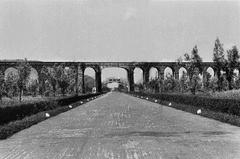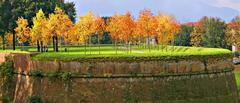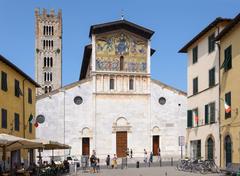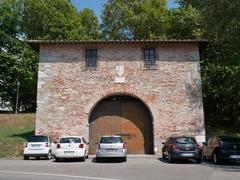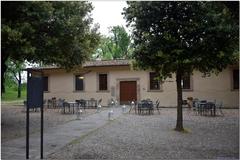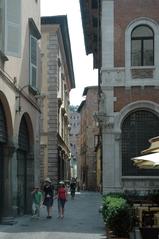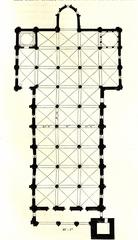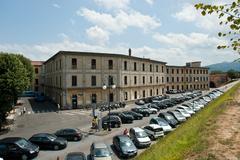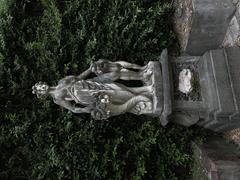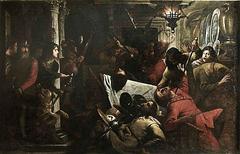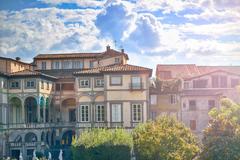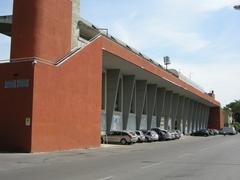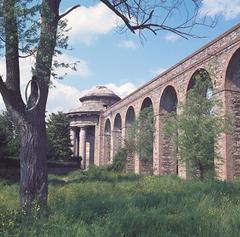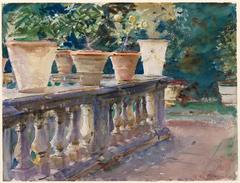Archivio Storico Comunale di Lucca: A Comprehensive Guide to Visiting Hours, Ticketing, and Historical Insights
Date: 14/06/2025
Introduction
The Archivio Storico Comunale di Lucca stands at the heart of Tuscany as a cornerstone for scholars, genealogists, and culturally curious visitors alike. Established during the early 19th century under the Napoleonic Principality of Lucca and Piombino, the archive documents the city’s transformation from 1806 through the late 20th century. Its holdings—spanning municipal council minutes, civic registers, urban planning documents, and extensive photographic collections—offer an unparalleled window into Lucca’s administrative, social, and cultural evolution.
Housed in architecturally significant buildings such as Villa Bottini and sites throughout Lucca’s historic center, the archive is both a research resource and a cultural destination. This guide provides detailed information on visiting hours, admission policies, archive holdings, research services, accessibility, and travel tips for integrating your visit with exploration of Lucca’s celebrated historical sites (Comune di Lucca, Archivista Provincia Lucca, Archivio Fotografico Lucchese).
Historical Overview
Origins and Early Development (1806–1865)
The foundation of the Archivio Storico Comunale di Lucca coincided with the far-reaching reforms of the Napoleonic era. The Municipality of Lucca, established in 1806 under Princess Elisa Bonaparte Baciocchi, began documenting its new administration in council minutes from July 17, 1806. Early years saw the city government relocate to the ex-convent of San Romano, with an increasing need for proper archival facilities (Archivista Provincia Lucca).
Institutionalization and Modern Era
In 1979, the archive was formally consolidated, merging pre- and post-unitarian documents. Today, it preserves over 1,480 linear meters of records, reflecting Lucca’s journey from Napoleonic reforms through Italian unification and into the modern age (Comune di Lucca).
Archive Structure and Collections
Main Sections
Preunitarian Section (1806–1865)
- Deliberazioni (council deliberations)
- Registri civici (birth, marriage, death records)
- Urban Planning and Public Works (e.g., “Pubblici abbellimenti,” “Nuova Piazza”)
- Subdivisions by historical localities such as Sant’Angelo in Campo and Massa Pisana
Postunitarian Section (1865–1983)
- Documents reflecting municipal governance, urban expansion, social services, and economic activities from Italian unification onwards
Aggregated Archives
- Holdings from dissolved institutions, including:
- Pia Casa di Beneficenza (1806–1985)
- Congregazione di Carità (1876–1937)
- Ente Comunale Assistenza (1937–1991)
- Consorzi Idraulici (1868–1916)
Note: Judicial and cadastral records are preserved at the Archivio di Stato di Lucca (Archivio di Stato di Lucca).
Photographic Heritage
The Archivio Fotografico Lucchese, housed at Villa Bottini, holds over 650,000 images, including:
- Fondo Ettore Cortopassi: 220,000 images documenting 20th-century Lucca life, monuments, and traditions
- Fondo Eugenio Ghilardi: 350,000 images focusing on religious and portrait subjects
- Additional donations: Collections like Raffaello Ferrari’s, expanding the archive’s scope internationally (Comune di Lucca)
Digitization projects are ongoing, making a growing number of records accessible through the Bibliolucc@ online catalogue.
Visiting Information
Locations
- Main Archive: Via Santa Giustina, 6, 55100 Lucca, Italy
- Photographic Archive: Villa Bottini, Via Elisa 9, 55100 Lucca, Italy
Contact
- Main Archive: +39 0583 442485 / +39 0583 445714 | [email protected]
- Photographic Archive: +39 0583 467660 | [email protected]
Opening Hours
- Main Archive: Monday to Friday, by appointment, during standard business hours
- Photographic Archive: Monday to Friday, by appointment only
Note: Both archives are closed on weekends, public holidays, and during major city events.
Booking Your Visit
- Visits require advance appointment. Contact by phone or email several days ahead.
- Bring valid photo ID and complete the request form (available via the official website).
- Walk-ins are not guaranteed.
Admission
- Free entry for consultation and research.
- Fees apply for reproduction services (e.g., scans, photocopies, authorized photography).
Accessibility
- The photographic archive at Villa Bottini is fully accessible.
- The main archive is in a historic building with some limitations—contact in advance for accommodations.
Research Services and Support
- On-site consultation with expert staff for navigating records
- Genealogical, historical, and administrative research assistance
- Digital resources: Growing online access to catalogues and images
- Special events: Cultural initiatives like Archivissima, offering guided tours (IMT Lucca)
Visitor Guidelines
- Use pencils for note-taking; pens/markers are not allowed
- Food and drinks are prohibited in reading rooms
- Handling of originals is supervised; gloves may be required
- Photography or scanning is permitted only with prior authorization
- Wi-Fi is not guaranteed; inquire on-site
Combining Your Visit: Nearby Attractions
The archives are ideally situated for combining research with sightseeing:
- Lucca Cathedral (Duomo di San Martino)
- Piazza dell’Anfiteatro
- Guinigi Tower
- Lucca’s Renaissance city walls
Lucca’s historic center is traffic-restricted (ZTL); parking is available at Parcheggio Carducci, with easy pedestrian access to the archive and other sites.
Preservation and Security
- Climate-controlled storage for fragile documents and photographs
- Restricted access to sensitive materials
- Archive closures during major city events for security
Frequently Asked Questions (FAQ)
Q: What are the visiting hours?
A: Monday to Friday, by appointment only. Closed weekends and public holidays.
Q: Is there an admission fee?
A: Entry is free; fees apply for reproduction services.
Q: How do I book a visit?
A: Contact the relevant archive by email or phone. Book several days in advance.
Q: Are the archives accessible for visitors with disabilities?
A: Villa Bottini is accessible; the main archive may present some challenges—contact staff for accommodations.
Q: Can I take photographs?
A: Only with prior authorization and possible fees.
Q: Are guided tours available?
A: Yes, especially during special events like Archivissima, with advance booking.
Q: Can I consult records online?
A: Many photographic and archival records are available via Bibliolucc@.
Tips for a Successful Visit
- Arrange your appointment well in advance
- Bring identification and any required forms
- Prepare targeted research questions
- Respect all archive rules to help preserve collections
- Consider combining your visit with a walking tour of Lucca’s historic sites
Visual and Interactive Resources
- Virtual tours and photo galleries are available via the Comune di Lucca website and tourism portals
- Official resources offer high-quality images and detailed descriptions for research and planning
Summary and Visitor Recommendations
The Archivio Storico Comunale di Lucca is a living chronicle of the city’s journey from Napoleonic principality to modern Italian municipality. Its diverse collections—spanning administrative, social, and photographic records—offer rich opportunities for research and discovery. Visitors benefit from free admission, personalized support, and the opportunity to explore the archive’s resources in architecturally significant settings.
To make the most of your experience:
- Reserve your visit ahead of time
- Explore digital catalogues and online exhibitions
- Follow the archive’s official channels for news and cultural events
- Download the Audiala app for curated tours of Lucca
Engage with Lucca’s heritage through this exceptional institution and enrich your understanding of Tuscany’s historical landscape (Comune di Lucca, IMT Lucca, Archivista Provincia Lucca).
Official Sources and Further Reading
- Comune di Lucca: Archivio Storico Comunale
- Archivista Provincia Lucca: Fonds 229
- Archivio Fotografico Lucchese a Fazzi
- Archivio di Stato di Lucca
- IMT Lucca: Archivissima 2024
- La Gazzetta di Lucca: Lucca e la sua storia in più di un milione e mezzo di fotografie per la comunità
